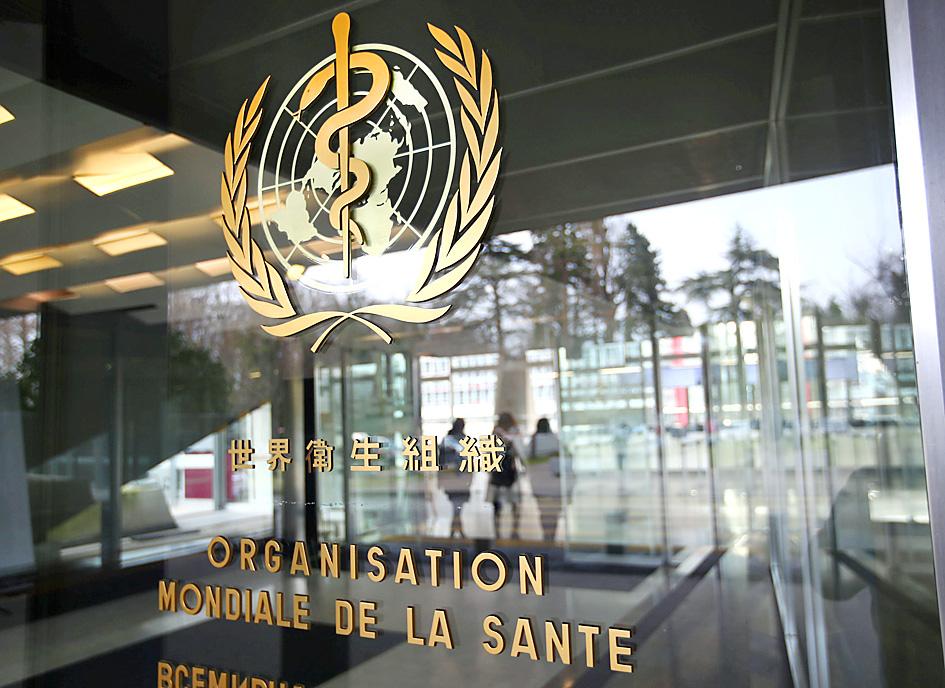The US Department of State on Friday launched a “TweetforTaiwan” campaign to rally support for Taiwan’s participation in the upcoming World Health Assembly (WHA).
The annual WHA, the WHO’s decisionmaking body, is expected to meet virtually on May 18 for its 73rd session.
Taiwan participated in the WHA as an observer from 2009 to 2016, but has not been invited since.

Photo: Reuters
After the American Institute in Taiwan (AIT), the US’ de facto embassy in Taiwan, on Friday launched a “WHACountdown” series of Facebook posts, the department’s Bureau of International Organization Affairs took to Twitter to urge support for Taiwan’s inclusion in the WHA.
“The US believes firmly that #Taiwan belongs at the table when the world discusses #COVID19 and other threats to global health. Before 2017, Beijing didn’t object to Taiwan joining the World Health Assembly as an Observer. What’s changed? #TweetforTaiwan,” the bureau wrote as part of a volley of tweets.
The bureau also shared President Tsai Ing-wen’s (蔡英文) post on Taiwan’s success in containing the pandemic, writing: “@iingwen, the contrast with the #PRC is striking. China’s response to the outbreak of #COVID19 has been to hide the facts, muzzle its scientists and censor discussion.”
The US mission to the UN wrote on Twitter that “@UN was founded to serve as a venue for all voices, a forum that welcomes a diversity of views & perspectives, & promotes human freedom. Barring #Taiwan from setting foot on UN grounds is an affront not just to the proud Taiwanese people, but to UN principles. #TweetforTaiwan.”
The Ministry of Foreign Affairs yesterday thanked the US for its support and creative campaign, adding that the hashtag campaign fully demonstrates Taiwan-US rapport.
Meanwhile, the Chinese mission to the UN in Geneva, Switzerland, blasted the tweet campaign as “[a]nother political trick,” saying that UN General Assembly Resolution 2758 “has long put an end to the Taiwan question.”
“Strongly oppose using this question to interefere [sic] in China’s internal affairs. Trying to shift the blame for inadequate response to #COVID19 in US? No way,” its tweet read, while tagging the bureau and the US Mission to the UN at the end of its post.
The Chinese mission on Friday issued a statement voicing its objection to the US mission’s stated support for Taiwan.
“There is only one China in the world. The government of the People’s Republic China is the sole legal government representing the whole of China and Taiwan is an inalienable part of China,” it said.
It urged the US to immediately stop speaking for Taiwan, and politicizing and undermining the international response to the pandemic, while abiding by its so-called “one China” principle, the Three Joint Communiques and UN General Assembly Resolution 2758.

Conflict with Taiwan could leave China with “massive economic disruption, catastrophic military losses, significant social unrest, and devastating sanctions,” a US think tank said in a report released on Monday. The German Marshall Fund released a report titled If China Attacks Taiwan: The Consequences for China of “Minor Conflict” and “Major War” Scenarios. The report details the “massive” economic, military, social and international costs to China in the event of a minor conflict or major war with Taiwan, estimating that the Chinese People’s Liberation Army (PLA) could sustain losses of more than half of its active-duty ground forces, including 100,000 troops. Understanding Chinese

The Ministry of Foreign Affairs (MOFA) yesterday said it is closely monitoring developments in Venezuela, and would continue to cooperate with democratic allies and work together for regional and global security, stability, and prosperity. The remarks came after the US on Saturday launched a series of airstrikes in Venezuela and kidnapped Venezuelan President Nicolas Maduro, who was later flown to New York along with his wife. The pair face US charges related to drug trafficking and alleged cooperation with gangs designated as terrorist organizations. Maduro has denied the allegations. The ministry said that it is closely monitoring the political and economic situation

UNRELENTING: China attempted cyberattacks on Taiwan’s critical infrastructure 2.63 million times per day last year, up from 1.23 million in 2023, the NSB said China’s cyberarmy has long engaged in cyberattacks against Taiwan’s critical infrastructure, employing diverse and evolving tactics, the National Security Bureau (NSB) said yesterday, adding that cyberattacks on critical energy infrastructure last year increased 10-fold compared with the previous year. The NSB yesterday released a report titled Analysis on China’s Cyber Threats to Taiwan’s Critical Infrastructure in 2025, outlining the number of cyberattacks, major tactics and hacker groups. Taiwan’s national intelligence community identified a large number of cybersecurity incidents last year, the bureau said in a statement. China’s cyberarmy last year launched an average of 2.63 million intrusion attempts per day targeting Taiwan’s critical

AGING: As of last month, people aged 65 or older accounted for 20.06 percent of the total population and the number of couples who got married fell by 18,685 from 2024 Taiwan has surpassed South Korea as the country least willing to have children, with an annual crude birthrate of 4.62 per 1,000 people, Ministry of the Interior data showed yesterday. The nation was previously ranked the second-lowest country in terms of total fertility rate, or the average number of children a woman has in her lifetime. However, South Korea’s fertility rate began to recover from 2023, with total fertility rate rising from 0.72 and estimated to reach 0.82 to 0.85 by last year, and the crude birthrate projected at 6.7 per 1,000 people. Japan’s crude birthrate was projected to fall below six,